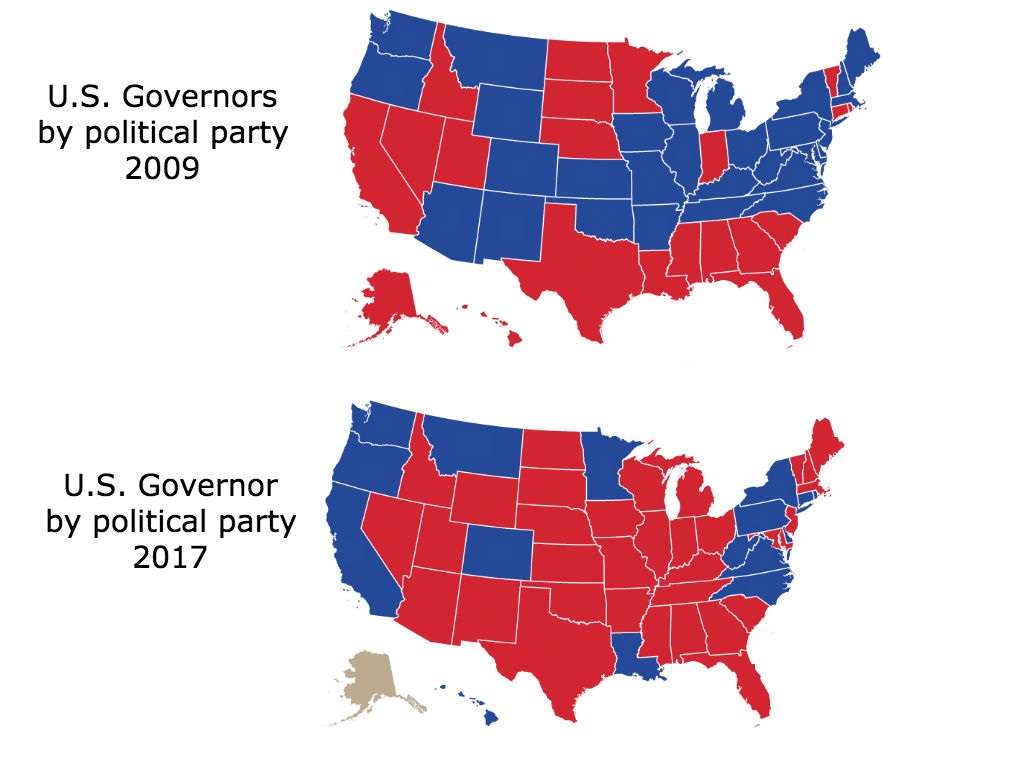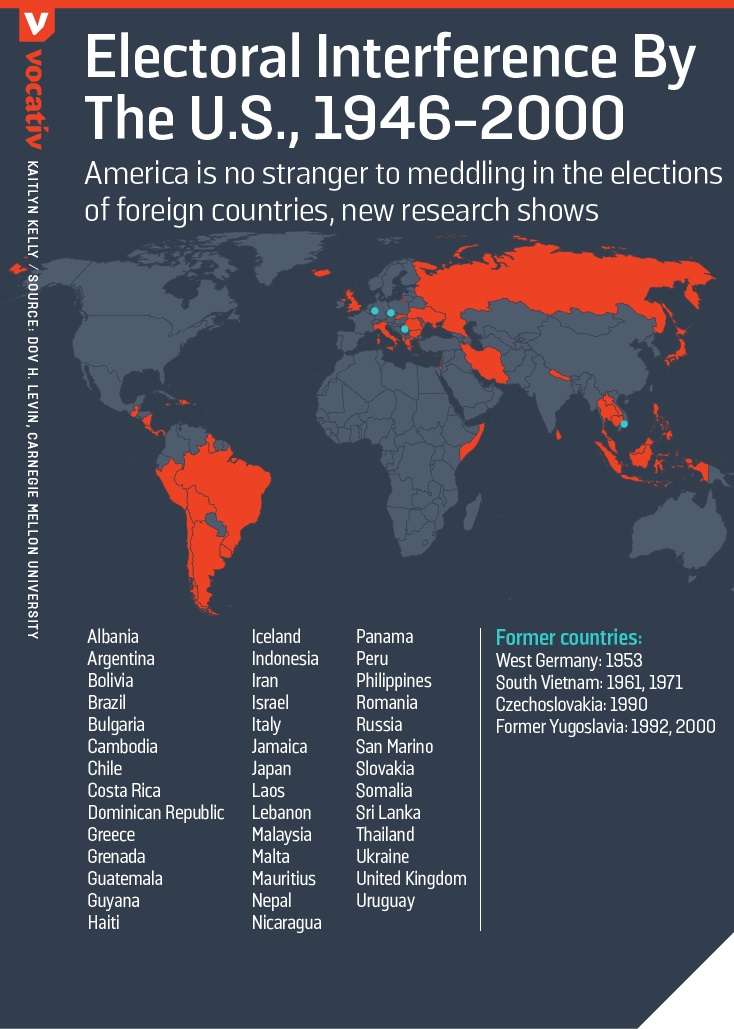Rep. John Lewis Says Trump Is Not a "Legitimate President" Due To Russian Meddling
If a foreign nation's intervention into elections is a crime, America has a LOT of explaining to do.

Few members of Congress have served longer and with more esteem that John Lewis, the Democrat from Georgia. Well-known and universally respected for his civil rights activism (for which he was physically beaten), Lewis is also not above slinging partisan mud hard and fast. In a new interview with NBC's Meet the Press, he goes so far to say, "I don't see this president-elect as a legitimate president….I think the Russians participated in helping this man get elected. And they helped destroy the candidacy of Hillary Clinton."
Lewis doubtless speaks for many Clinton supporters and other members of Congress (who knows, maybe some Republicans agree with his assessment too?). Yet this is a line that rarely gets crossed in public discussions and, in the cases when it is crossed, the media and political players usually heap scorn on the speaker. Anytime someone says X or Y is not MY president, he gets a shit-ton of pushback. I'm guessing that that won't happen here, even though the evidence that Russians "hacked" the election is extremely weak and even risible at this point in time.
To remind us all: There's no publicly available evidence that Russian agents came anywhere close to election machines or had any impact on the way votes were tallied (that is, things could accurately be described as hacking). When the unclassified version of the Office of National Intelligence report on Russian activity came out, it provided more assertions but no real evidence tying the release of DNC and Podesta emails to Russian higher-ups and instead spent a lot of time talking about how state-owned propaganda entities RT and Sputnik covered American politics. As Scott Shackford wrote:
They point to the fact that RT hosted debates from third-party candidates and publicized the idea that the two-party system doesn't represent a third of voters. In addition, they call the United States a surveillance state full of civil liberties abuses, police brutality, and drone use…. Look at those examples and they could apply not just to Reason but to media outlets of varying ideological positions within America. Americans are abandoning the two political parties. People are genuinely upset about surveillance and police brutality. If this is an attempt to sway the public to be concerned about RT, it's not terribly persuasive. And it's several years after the reality of what RT is came to light anyway, so it just reads rather dated.
Even arch-critics of Trump and Putin conceded the public report and discussion doesn't actually prove what has been charged: That Russian government actors are behind the hacks of DNC and Podesta emails and then fed them to Wikileaks and (as important) that those things and other Russian activities tipped the election to Trump. And yet, we can safely assume, I think, that Russians (and political players in every other country that could do so) wanted to influence the election one way or another. Hell, the U.K.'s Nigel Farage, fresh off his Brexit win, campaigned for Trump. I assume that Putin preferred Trump, who has signaled more clearly than a whore in an Amsterdam window that he's ready to do business with Russia in a way that Clinton was not. You might disagree with that virulently, but it's a far cry from saying Trump won because of Putin's secret-agent activities.
In fact, the Tweeter in Chief himself, has a much-more plausible explanation for why Hillary Clinton, who once noted with exasperation that she should have been 50 points ahead against such a uniquely unqualified joke candidate, pulled up short:—
…She lost because she campaigned in the wrong states - no enthusiasm!
— Donald J. Trump (@realDonaldTrump) January 13, 2017
I write as a #NeverTrumper (I voted for Gary Johnson), but I find Lewis's comments and broader attempts not simply to disagree with political opponents but to delegitimate them troubling for several reasons.
First, they are simply a continuation of a tedious, decades-long unwillingness by losers to acknowledge the basic rules of the very game they have rigged. Remember when George W. Bush was not "elected" but "selected" in 2000? Listen closely any time someone from The Nation shows up on MSNBC and there's a good chance that'll still come up. I get it, that was the tightest possible race and it really did come down to a coin flip in the form of a Supreme Court vote that really could have gone either way. But them's the rules and you live and die by them. In 2004, a non-trivial number of Democrats and liberals went on an ideological bender talking about how Ohio's voting machines were tampered with, so again Bush, who handily kicked John Kerry's ass, was again the target of "not my president" bullshit. Barack Obama faced a virulent variant of the same sort of antagonism, first with the whole cooked-up birth certificate deal (Trump himself was obssessed with this after Hillary supporters first popularized the notion) and constant attempts to prove that he was a secret Muslim as well as a Kenyan and a socialist (Dinesh D'Souza and others media grotesques have managed to milk these fears into personal retirement funds). About the only attempt at de-legitimatization Obama didn't face was somebody proving that he was white and therefore unworthy of office. Increasingly over the past several decades, presidential races have been getting closer and closer—think of it, Bill Clinton couldn't reach 50 percent of the vote against Bob Dole, a terrible candidate who pledged to serve only one term because he was so used up!—because the Republican and Democratic Parties represent fewer and fewer of us. More people register as independents because there's no good goddamn reason to become a donkey or an elephant. Claiming a system is rigged simply because you're not succeeding is a great way to sow discord and nihilism in society, especially when such claims are untethered to reality.

Second, claims that Russians determined the election deflect blame and responsibility and project it outward. Hillary Clinton lost this election because she didn't bring out the Obama coalition or create an feasible alternative set of voters (and remember, she did win the popular vote, mostly because she ran up the score in states such as California and New York rather than campaigning in in-play states with much-need electoral votes). She went to Chipotle (once) more often she went to Wisconsin (zero) during the election! During the eight years of Obama's tenure, the Democratic Party has lost power everywhere, not just in the federal government. Did governor's mansions in Kansas, New Mexico, and Iowa flip to Team Red because of Russian "hacking" or meddling? If in fact the Democratic Party is on the verge of not being a national party anymore, that has very little to do with rigged Diebold electronic voting machines or confusing butterfly ballots or secretive Russian hackers and Soviet-era honeypot traps and more to do with that Democrats are selling at every level of retail politics. It's not as if the American people love or trust the Republicans more than they do the Dems. In fact, most polling shows that most of us dislike each party pretty equally. In the book I wrote with Matt Welch, The Declaration of Independents: How Libertarian Politics Can Fix What's Wrong with America, we tracked just how volatile party politics have been the early years of this century. At first, the GOP was in control of Congress and the White House and everyone starting talking about how Republicans had achieved a "permanent governing majority." That lasted for a few years, when suddenly we were face to face with the "emerging Democratic majority" that was as unstoppable a Mack truck whose brake lines had been cut. As recently 2013, the Dems controlled the Senate! What we're seeing is an intensely closely divided government that is flipping back and forth because each party has fucked up each time it's in power. That leads to historically rapid and wild swings in congressional representation. The Russians didn't shove 50 percent increases in federal spending down Bush and the GOP's throats in the early 21st century, or TARP, or No Child Left Behind, or Sarbanes-Oxley, or two endless wars, all of which led to the Dems winning control for a while. And I'm pretty sure it wasn't Putin who coaxed Obama and Nancy Pelosi and Harry Reid into making the still-unpopular The Affordable Care Act the number-one priority of Dems when they controlled the White House and Congress. Or Dodd-Frank or a B.S. stimulus, etc. Losing parties should spend more time doing personal inventories than immediately blaming failure on everyone but themselves.

There's at least one more reason why John Lewis' comments about Russian meddling or "hacking" is problematic, though this time in a good way. It should force all Americans to ask whether our nation (well, our government, which is not the same thing) similarly "participates" in foreign elections and whether that's legitimate or not. The plain fact of the matter is that the United States absolutely involves itself in elections all over the world, and on a regular basis. According to research done Carnegie-Mellon's Dov Levin, between 1946 and 2000, U.S. government actors tried to influence foreign elections at least 81 times in 45 countries. This doesn't include covert and overt military actions or even U.S.-supported coups (such as the one in Honduras abetted by Secretary of State Hillary Clinton in 2009). Here's how Vocativ's Shane Dixon Kavanaugh summarizes Levin's work:
He defines an electoral intervention as "a costly act which is designed to determine the election results [in favor of] one of the two sides." According to Levin's research, that includes: peddling misinformation or propaganda; creating campaign material for preferred candidates or parties; providing or withdrawing foreign aid, and; making public announcements that threaten or favor certain candidates. Often, it also includes the U.S. covertly delivering large sums of cash, as was the case in elections in Japan, Lebanon, Italy, and other countries….
Much of this activity took place during the Cold War and Levin also documents that the Soviets did similar things, though because they had more direct control of satellite nations, they actually had less work to do. But even with the collapse of the Cold War and the start of a new century, the United States is still working to influence elections abroad (indeed, Clinton's actions in Ukraine are supposedly the cause of Putin's deep-seated hatred of her, despite the "reset" with Russia she attempted as secretary of state).
Even after the Soviet Union collapsed in 1991, the U.S. continued its interventions abroad, including elections in Israel, former Czechoslovakia, and even Russia in 1996, Levin found. Since 2000, the U.S. has attempted to sway elections in Ukraine, Kenya, Lebanon, and Afghanistan, among others.
Does this mean that the Russian and U.S. governments are morally equivalent? No, it does not. Vladimir Putin is a brutal thug who has ordered the deaths of journalists and others; he is ruler of a state that is always on the brink of failure. But there is a growing number of people who are painting Russia as a threat that is on par with the old Soviet Union and thus a country with which, what, we cannot negotitate or trade or cooperate in any meaningful way (never mind that we negotiated constantly with the Soviets). Right-wing neocons and left-wing anti-Trumpers are popping up more and more frequently to say that Russian interests are always and everywhere inimical to American interests and Russia should not be allowed to have any "sphere of influence" outside of its own borders. Increasingly, we are told that Russia plays by "different rules," such as…trying to influence elections in foreign countries.
If meddling or "participating" in foreign elections represents some Rubicon no legitimate government should ever cross, then the United States has more than a little explaining to do. And in trying to delegitimate Donald Trump, the John Lewises of the world may end up delegitimating the very country they represent.


Show Comments (210)